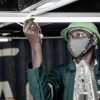Network meetings – When makers exchange ideas
In its projects, Germany’s Green People’s Energy (GBE) programme relies on a lively exchange of experience between African and German partners. At the end of May, the GBE organised a network meeting with its German partners, with over 30 participants discussing energy cooperatives, education programmes and how they could use CO2 certificates for investments in African countries. This was but the first of many such meetings.
To help renewable energies and the solutions they need achieve a broad breakthrough, various adjustment are still needed. Hardly anyone knows this better than GBE’s German partners who for many years have been committed to generating green and sustainable electricity in the country. This makes regular exchanges all the more important, as was demonstrated at the first German network meeting the GBE hosted on 25th May 2022.
During the three-hour digital meeting, participants took part in lively discussions in four forums on the subjects of framework conditions, renewable energies, energy cooperatives, education and training, returning to the plenary every hour to hear the results from the various forums.
In her keynote, Energy Commissioner Bärbel Höhn summed up the opportunities and challenges for African civil energy. Without locally generated energy, for example, African farmers cannot irrigate their fields cost-effectively, dry fruit or vegetables, cool fish and meat, operate micro-enterprises. “Energy is the prerequisite for local value creation and a future in their homeland.”
“We can’t do it without women”
However, renewable energies are only a solution if used sustainably. “We need a good operator model, you also have to be able to fix things, the local population has to be involved, local knowledge has to be built,” she said.
In Germany, many citizens’ initiatives have chosen the cooperative as their operating model, mainly because it has a long tradition and is well developed in the country. In Africa, with the exception of Ethiopia, this model still needs to be established properly. “We need alternative solutions here. And we have to make sure that women have a seat and a voice in these committees. Without women we cannot manage the change,” said Höhn.
Before meeting in the forums, GBE director Elina Weber expressed to participants her offer to build a network for German and African partners and to support any cooperation.
Four forums – lots of ideas
The opening in each forum was held by one or two GBE partners reporting on their cooperation with African companies and institutions. For example, Prof. Dr. Elmar Steurer from Neu-Ulm University of Applied Sciences and Ugandan Christian University wants to introduce digital learning methods with the help of solar mini-grids in rural Uganda. The digital curricula could enable future adults to make better use of renewable energies and digital solutions in the future.
CO2 certificates – drivers for investments?
One of the most pressing questions for operators is how to refinance investments. CO2 certification can play an increasingly important role in future. Together with the GBE, Elmar Steurer is investigating to which extent CO2 certificates can be used to finance mini-grids. The City of Mannheim in Germany is thinking in the same direction. It intends to launch a project shortly with the aim of giving companies based in Mannheim the option to compensate for CO2 by investing in renewable energy projects in the city.
“We are still in the exploratory phase. But there are investments and there is interest in improving the carbon footprint. We want Mannheim companies to work with us on this,” says Stephanie Oechsner. The amount of the CO2 price per tonne will play a role, but so too will costs of certification. “This is still difficult for small plants,” added Stefan Eibisch of GBE, at least based on the programme’s experience together with spin-off company Solar Cooling Engineering of Victor Torres Toledo.
From association to association
A completely different kind of cooperation is being promoted by the BSW – Bundesverband Solarwirtschaft e.V. in Namibia. “We are supporting the Namibian solar association REIAoN with the aim of working better with rural actors,” says Rainer Upmann, Communications Officer at BSW. The association still has around two dozen members, mainly solar companies based and headquartered in Windhoek. However, there are still many more smaller companies and workshops in rural areas waiting to be connected.
Problems with customs
Numerous participants presented projects in the forum for productive use. Victor Torres Toledo from Solar Cooling Engineering reported on activities with Kenya’ Strathmore University, which now has 3,000 technicians for solar applications. Funded by the GBE’s Small Projects Fund, the Kenyan university has developed a training course on solar cooling that trains experts in developing, designing and building solar-powered cold rooms and refrigerators themselves. The training is now in such demand that Strathmore University can charge a market price of 280 euros per training.
The idea of Hermann Schuten from the International Rural Development Service is to develop wind turbines in Uganda, preferably sourcing materials and technicians locally, and to make the knowledge accessible as an open source manual for all those who have similar plans.
Many German projects have problems with getting materials through customs in their partner countries without having to invest a fortune. With the corona pandemic, tax revenues plummeted once again. Many countries therefore had to increase customs fees. Further information exchanges are in the pipeline.
Solar cases and summer schools
If you want to know how municipalities can use the energy transition for local value creation and independence from energy imports, a trip to Wildpoldsried in Bavaria is worthwhile. There, almost 300 privately owned photovoltaic systems generate so much electricity that the municipality is almost energy self-sufficient. However, the energy village’s producers aren’t just interested in their own well-being. Second Mayor Günter Mögele, together with Willi Kirchensteiner and Manfred Wolf, has designed a solar suitcase and designed atraining programme for African users.
In 2019, former Development Minister Gerd Müller handed over the first of these suitcases to African vocational school teachers who had just completed a 14-day training course in Wildpoldsried. Günter Mögele gave an overview of this commitment in the Training Forum. Elmar Steurer found this so exciting that he announced his visit with Ugandan participants from his summer school at the next network meeting. It was precisely this sort of exchange the network meeting intended to foster.




